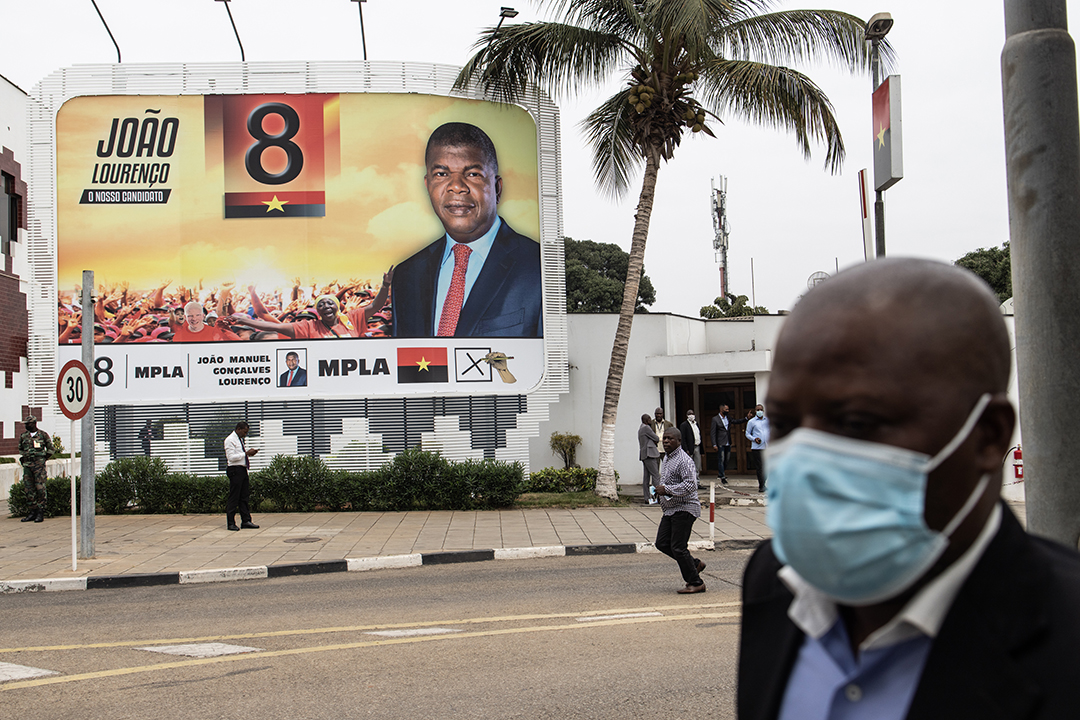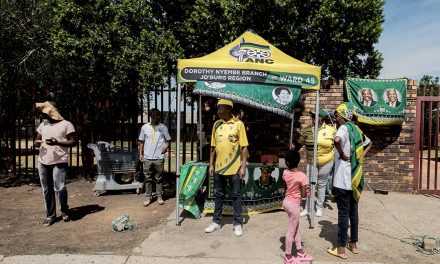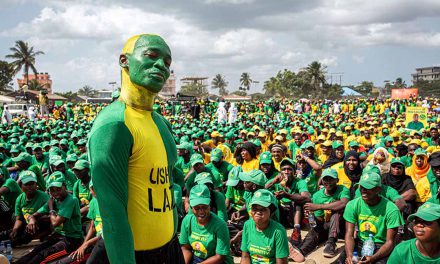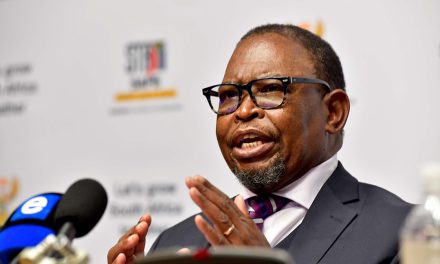Last week, Good Governance Africa’s Craig Moffat predicted that the MPLA would retain power in Angola’s 24 August elections: “While UNITA has made inroads, it may not yet be ready to defeat the long-ruling incumbent MPLA at the polls on 24 August 2022.” And in a short video interview, Ross Harvey, the director of research and programmes at the NGO, suggested that the advantages of incumbency would help the MPLA to carry the day despite an unprecedented and strong showing by UNITA ahead of the polls.

A man walks past a campaign poster at the People’s Movement for the Liberation of Angola (MPLA) party headquarters, two days after general elections, in Luanda. Angola’s long ruling MPLA party was declared the winner of the closely fought election on August 24, 2022, extending its decades long rule in the oil-rich country and handing President Joao Lourenco a second term. Photo: JOHN WESSELS/AFP
Perhaps neither of us would have expected that the MPLA would win by such a slight majority. In this article we explore the results in more detail, explain why the MPLA is falling out of favour, and offer a view of the near-term political economy implications for the country.
The election results are being contested in court but the final tally from the national electoral commission (CNE) put the MPLA in at 51.17% of the vote, while UNITA came in with 43.95%. This is a significant loss of 26 parliamentary seats for the MPLA since the previous election in 2017, in which it secured 61% of the vote. UNITA, meanwhile, gained 39 seats.
There are a total of 220 seats, so it was essentially a two-horse race, with the next three contenders attaining only two seats each. In any election, analysts must read between the lines. The headline results are significant but they often mask other important dynamics. Three points suffice in this respect.
First, Angola has 14.4 million registered voters. Only 6.5 million of them (44.82%) turned out to vote on the day. Voter turnout is defined differently in different parts of the world, with some countries dividing the voters on the day by the total population eligible to vote (rather than only those that have registered).
On that definition, Angola’s turnout would have been an even lower percentage. By way of comparison, South Africa’s most recent voter turnout percentage was 66% in 2019. On a voter-eligible denominator, that figure goes down to 49%.
This tells us something significant about Angola’s electoral landscape but an accurate inference cannot be drawn until we have more data. Informed conjecture might suggest that many voters are either too fearful to vote against the ruling party or have lost faith in elections as a vehicle through which life might materially improve.
Second, the above conjecture appears to be corroborated by the geographic distribution of the votes. UNITA had an overwhelming victory (62.6%) in the capital area of Luanda, previously an MPLA stronghold. UNITA also gained victories in the northern oil-rich exclave of Cabinda (Angola’s only onshore oil deposit) and the north-western province of Zaire.
The MPLA maintained its dominance throughout the rest of the country, which was almost entirely de facto UNITA territory during the civil war that lasted from 1976 to 2002. The unprecedented gains made by the opposition would have sent shockwaves through the MPLA, and at some level, the political elites must realise that although they may have won at the polls, the results are widely perceived as a political defeat.
Historically, the MPLA was known as an urban party, ideologically sophisticated and ethnically diverse. Even though the intellectual rigour of the party was diluted through the failed coup attempt of 1977 and the subsequent years of José Eduardo dos Santos’s growing personal power, the MPLA remained dominant in Luanda even until the last elections.
Third, although the Angolan electoral commission does not release voting data by age, it appears that many new voters in this election would have been born after 2002. This new youth electorate has protested against the MPLA’s destructive rent-seeking for years, mostly in Luanda, and been heavily repressed. When João Lourenço came to power in 2017, he promised to strengthen civil liberties. Instead, he has been accused of abusing the state security apparatus for repressive purposes just as much as his predecessor.
It is partly for this reason, and because the economic turnaround promised by Lourenço has not come to fruition, that the youth electorate would have voted against the incumbent.
Lourenço inherited a fiscal cliff, an economy over-reliant on oil (92% of exports and about 50% of GDP) and extensive poverty (more than half of the population still live on under $2 a day). Post-2002, the MPLA swapped out its wartime oil-for-arms deals with the Soviet Union for oil-for-infrastructure deals with China. Although this brought some development, legitimate expectations for broad-based growth remained unmet by the reality of white elephants and extreme wealth accumulation by political insiders.
Under Dos Santos, who ruled for 38 years, oil rents both financed the MPLA’s victory over UNITA in the war and carefully calculated patronage thereafter. Oil rents are addictive for ruling elites, as they tend to increase the cost of reform and lower the relative cost of repression.
In Angola, there were always likely to be two channels through which real change could break through. First, the post-2014 collapse in the oil price showed the vulnerability of the MPLA, and Dos Santos in particular. Budgets were built on an expectation of at least $70 a barrel, but Brent crude moved from heights of well over $100 a barrel down to a prolonged equilibrium of $50 a barrel. This created severe indebtedness, and Angola owes at least $19-billion to China alone, although the full extent of Chinese debt remains somewhat opaque.
External debt to GDP reached 108% at the last available count, which placed extensive pressure on Lourenço to reform in the direction of diversifying the economy. But post-Covid global economic recovery and the Russia-Ukraine war drove oil prices back up to more than $100 a barrel, and they are likely to close out the year at about $106 a barrel. This provided some reprieve for Lourenço and possibly allowed a mild replenishing of the electoral patronage chest.
An MPLA victory was perhaps inevitable because Angola remains a highly securitised state with little history of competitive elections. Moreover, the MPLA remains in control of the electoral commission and the courts. Nonetheless, this election has demonstrated that the wind of change is blowing. In an unprecedented move, four members of the CNE have disassociated themselves from the (still provisional) results because of “constant and systematic violations of the law”.
In the next five years, if the MPLA is to regain legitimacy, it will have to usher in economic and political reforms that it will find risky given its history.
What Angola requires, economically, is a sensible allocation of oil rents to build critical infrastructure, and a stable policy environment that attracts responsible investment. Politically, the state will have to release its grip on the security apparatus and strengthen civil liberties — allowing protest without repression would be a good start.
The Southern African Development Community observer mission was also very clear — if diplomatic — that Angola has some way to go before its elections can truly be considered free and fair. First, the CNE must become impartial and more efficient. Second, the voters’ roll should be published at least 30 days prior to the set date of any given election (which did not happen this time around). Among other things, this helps to identify any ghost voters that may stack the deck in favour of the incumbent. Third, observers need to be granted freedom of movement in the country and be timeously accredited.
Angolans deserve better than the leaders that have enjoyed the country’s black gold at the expense of the majority poor for the last two decades.
This article was originally published in the Mail and Guardian on 31 August 2022













